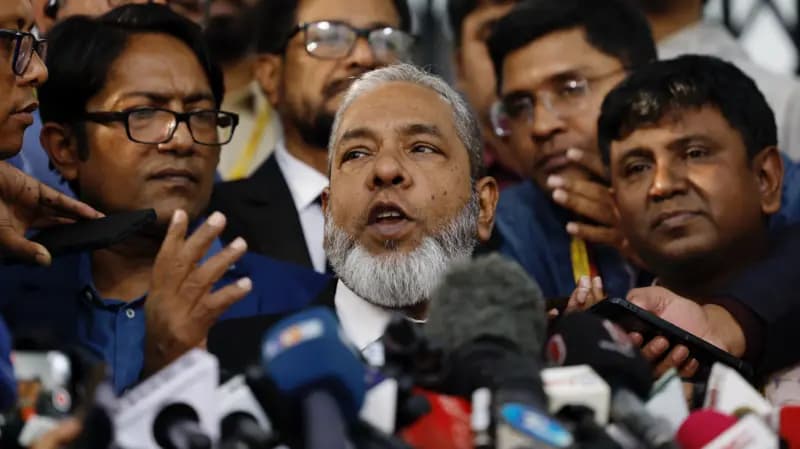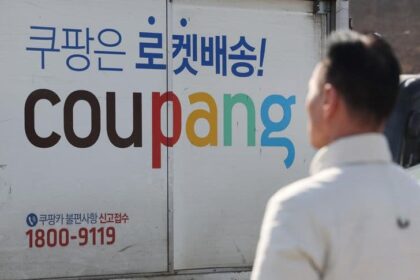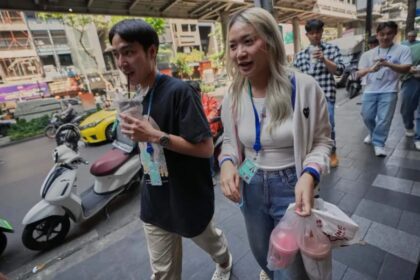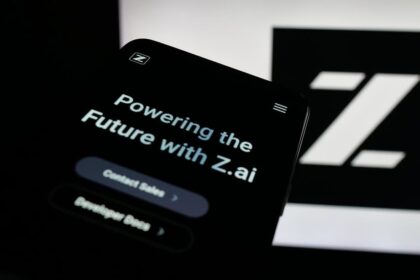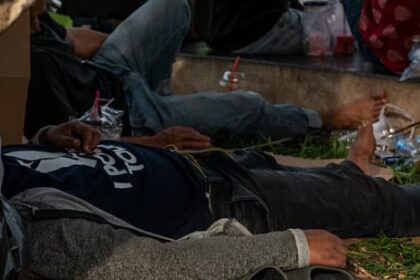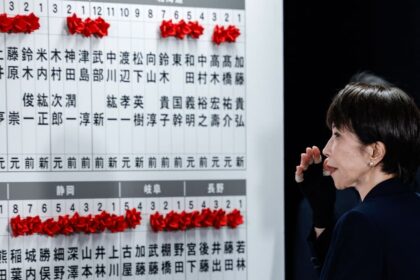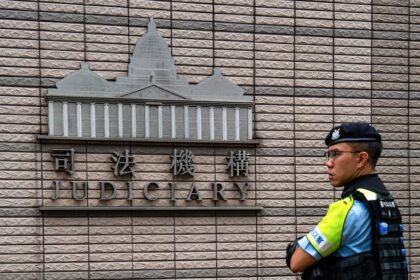A historic and polarizing verdict rocks Bangladesh
Bangladesh’s International Crimes Tribunal in Dhaka has sentenced former prime minister Sheikh Hasina to death after finding her guilty of crimes against humanity tied to the lethal suppression of last year’s student uprising. The court tried the 78 year old leader in her absence. She has lived in exile in India since her government fell in August 2024. A United Nations fact finding effort estimates that up to 1,400 people were killed during the weeks of protests, most from gunfire by security forces. The ruling has ignited jubilation among some families of victims and grief filled protests in parts of Dhaka, while tightening a national security clampdown. It also raises urgent diplomatic questions for India, where Hasina has sought refuge, and where authorities face a sensitive decision about possible extradition.
- A historic and polarizing verdict rocks Bangladesh
- The verdict and the charges
- How the 2024 student uprising unfolded
- The tribunal on trial: fairness, transparency and the death penalty
- Streets on edge: protests, security measures and risk of unrest
- Hasina in exile: denial, strategy and the India question
- India’s calculus and regional stakes
- Awami League and the coming election
- Economy and garment industry: what is at stake
- Next legal steps and political scenarios
- What to Know
Hasina rejects the charges and denounces the tribunal as illegitimate. The interim administration led by Nobel Peace Prize laureate Muhammad Yunus has called the judgment historic and urged calm, warning against any attempt to exploit the verdict for violent agitation. Bangladesh’s foreign ministry has asked New Delhi to hand over Hasina and former home minister Asaduzzaman Khan, who was also sentenced to death. India has signaled it will engage constructively, but legal and political obstacles make extradition doubtful in the near term. The tribunal imposed a five year sentence on former police chief Chowdhury Abdullah Al Mamun, who cooperated as a state witness. With national elections planned for February, the decision comes at a moment of deep polarization and public anxiety.
The verdict and the charges
The three judge panel convicted Hasina of incitement, ordering killings, and failing to prevent atrocities during the July and August 2024 unrest. Judges issued a single sentence of death. Prosecutors argued that security forces and pro government cadres acted on directives from the top leadership to clear streets with live ammunition and heavy force. The indictment listed emblematic incidents, including the shooting of university student Abu Sayeed, the killing of six unarmed protesters in central Dhaka, and burnings in an industrial suburb. The court heard that law enforcement units used lethal weapons and, in some cases, specialized tools including drones and helicopters during street operations.
Former home minister Asaduzzaman Khan received the same punishment as Hasina after being convicted on parallel charges. The tribunal found former inspector general of police Chowdhury Abdullah Al Mamun guilty on lesser counts, citing his cooperation and testimony that described chains of command and the use of lethal force against civilian crowds. Proceedings in the case were broadcast widely, and the packed courtroom erupted in applause and prayers when the death sentences were announced. Outside, riot police sealed off streets and pushed back crowds that had gathered to await the outcome.
Although labeled an international crimes tribunal, the court is a domestic judicial body that applies Bangladeshi law to crimes against humanity. The tribunal’s remit covers murder, persecution, torture and other inhumane acts committed as part of a widespread or systematic attack on civilians. In Hasina’s case, prosecutors said they had documentary material and testimony pointing to coordination from her office during the critical weeks when protests peaked and security forces opened fire.
Chief Prosecutor Mohammad Tajul Islam framed Hasina as the architect of the repression. Introducing his argument, he described the state’s view of her role during the unrest.
As Bangladesh’s chief prosecutor, I see Sheikh Hasina as the mastermind and principal architect of the atrocities unleashed on unarmed protesters last July and August.
The defense, led by a state appointed counsel because Hasina did not appear, maintained that the charges were baseless and that the tribunal lacked independence. Judges rejected those objections and delivered the country’s most severe judgment against a former head of government since independence in 1971.
How the 2024 student uprising unfolded
The movement that toppled Hasina began on university campuses last July with anger over a decades old civil service quota system. One third of government jobs had long been reserved for descendants of veterans of the 1971 war of independence. Students argued that the policy had morphed into an unfair gateway for patronage and corruption, sealing off opportunities for qualified candidates without political connections. Rallies spread from Dhaka’s main campuses to cities across the country. Confrontations escalated when police used force to clear marches and opposition groups joined the streets.
By mid July, what began as campus agitation had turned into a national challenge to Hasina’s long hold on power. Security forces fired on crowds, witnesses filmed chaotic scenes, and social media amplified images of wounded students and grieving families. Human rights monitors accused the authorities of systematic abuses, including live fire aimed at demonstrators and severe beatings during arrests. On August 5, 2024, amid surging protests and clashes, Hasina resigned and fled across the border to India. Protest leaders and the military backed Nobel laureate Muhammad Yunus to head an interim government tasked with stabilizing the country and preparing credible elections.
The killing of young people gave the uprising its enduring name, the July revolution, and a set of images that galvanized public opinion. Relatives of the dead packed court hearings through the months long trial, telling reporters they sought accountability for loved ones who never came home.
Golam Rahman, whose son Golam Nafis was shot during the unrest, spoke about why the ruling matters to bereaved families before the verdict was read out.
For families of the martyrs, the death sentence is the only verdict that can tell future rulers there is a line they cannot cross.
After the caretaker administration took charge, it moved to reduce the quota system that helped ignite the street movement. That policy shift soothed some student grievances, but scars from the violence remained. Many survivors endured severe injuries and long hospital stays. Thousands of families continue to seek answers about accountability for the days when gunfire tore through crowds.
The tribunal on trial: fairness, transparency and the death penalty
Bangladesh established the International Crimes Tribunal in 2009 to try atrocities linked to the 1971 war of independence. Over the years, rights organizations criticized its procedures, warning of political interference and due process shortfalls. The court retains the power to impose capital punishment, a stance that draws concern from groups that oppose the death penalty in any context. After Hasina’s government fell in 2024, the reconstituted tribunal shifted attention to crimes linked to the uprising that ended her rule.
The case against Hasina moved quickly. Formal charges were filed in mid 2025 after investigators gathered witness statements, official documents and video evidence. Prosecutors called 54 witnesses, and the charge sheet stretched to thousands of pages. The tribunal found that the weight of testimony, which included cooperation from the former police chief, demonstrated command responsibility at the highest level. In July this year, while she was in India, Hasina received a short jail term for contempt of court over remarks the tribunal deemed to undermine the process.
How trials in absentia work in Bangladesh
Under tribunal rules, proceedings can continue if an accused person fails to appear or is considered to have absconded. The court must appoint a lawyer to represent the accused and allow that counsel to cross examine witnesses and present arguments. Supporters of this approach say it prevents powerful defendants from blocking justice by staying abroad. Critics argue that the absence of the accused makes it harder to test evidence and undermines public confidence. In this case, judges concluded that Hasina had adequate representation and that the evidence met the legal standard for conviction.
Appeals are possible in Bangladesh’s Supreme Court. However, tribunal procedure typically requires a convicted person to surrender or be in custody before filing an appeal. That condition complicates Hasina’s legal path while she remains in India. Prosecutors have also pursued cooperation with Interpol, but efforts to secure a red notice for high profile figures from the 2024 crackdown have moved slowly.
Streets on edge: protests, security measures and risk of unrest
Dhaka and other urban centers braced for disorder in the hours before the verdict. Police reported a series of crude bomb blasts and vehicle torchings in recent days. On Monday, crowds gathered near the tribunal and at symbolic sites in the capital. Security forces set up cordons, restricted movement, and used tear gas and sound grenades to disperse marchers who tried to break through barricades. The Rapid Action Battalion and army units supported police in holding key intersections and government complexes.
One flashpoint was the house of Bangabandhu Sheikh Mujibur Rahman, a site of deep national significance. Demonstrators brought construction equipment as they attempted to damage what remains of the property. Security forces responded with baton charges and tear gas. Shops pulled down shutters and traffic halted for hours along major corridors, including Mirpur Road and Panthapath. Several protesters and officers were reported injured as bricks flew and police pushed back with shields and batons.
Authorities warned that any attempt to incite violence or vandalism would be met firmly. The interim government asked citizens to stay calm and avoid gathering in large numbers. At the courthouse, some families of victims wept and prayed after the sentences were read. The country now faces a tense period before elections, with fears that factional clashes could return streets to the volatile scenes seen last year.
Public opinion remains sharply divided. Many students who led the uprising say the sentences confirm that those who ordered lethal force will be held to account. Others worry the verdict will deepen political fracture and complicate the effort to organize credible polls in a country where distrust of institutions is high.
Hasina in exile: denial, strategy and the India question
From her refuge in India, Hasina issued a statement rejecting the court’s authority and accusing the interim leadership of using a show trial to destroy the Awami League, which dominated politics for more than a decade and a half. She portrays herself as the last elected prime minister resisting an undemocratic caretaker administration.
In her response to the judgment, Hasina said the process lacked credibility and was orchestrated by an unelected authority.
This verdict comes from a rigged tribunal established and presided over by an unelected government with no democratic mandate.
Bangladesh has formally asked India to extradite Hasina and the former home minister. New Delhi has not promised extradition. Indian officials have said they will engage with Dhaka on the request. India and Bangladesh have an extradition treaty, but such agreements often include exceptions for offenses that are considered political. Hasina is a long time ally of India’s leadership, and political sensitivities in both countries make a transfer unlikely in the short term. Even so, pressure from Dhaka will persist as the Yunus government seeks to enforce the court’s decisions.
Hasina’s son, Sajeeb Wazed, has adopted a defiant tone about his mother’s status in India and the future of the Awami League.
My mother will remain safe in Delhi, but she will not sit back quietly. She is determined to fight back.
His remarks reflect a wider strategy by Awami League figures in exile to challenge the tribunal’s legitimacy and rally support among party loyalists. If extradition does not happen, Hasina’s legal options within Bangladesh are limited unless she returns or is detained, which would trigger immediate custody and likely fast track appeal filings.
India’s calculus and regional stakes
New Delhi faces a delicate balancing act. Bangladesh is a critical neighbor for trade, connectivity and border security. Indian leaders also have long standing personal and political ties with Hasina. Openly rejecting Dhaka’s request could strain relations with the interim government and embolden Hasina’s critics at home. Moving quickly to cooperate could be seen in India as an abandonment of a partner who helped deliver closer ties on security and economic issues for years.
India must also consider public messaging in both countries. A hard line against Hasina could inflame her supporters and ricochet into domestic politics in Bangladesh ahead of the polls. A noncommittal approach preserves room to maneuver and keeps channels open with whoever emerges as the next elected leadership in Dhaka. For now, a case by case handling of legal steps, without a firm commitment on extradition, appears the most likely path.
Awami League and the coming election
The Awami League, once Bangladesh’s dominant political machine, is now sidelined. The party has been barred from contesting the upcoming vote, and many senior figures are either in custody or in hiding abroad. Loyalists insist they will remain a force. The verdicts will reshape their tactics, as they weigh street mobilization against the risk of a crackdown and the legal exposure that comes with defying emergency rules.
The interim government’s mandate is to deliver a credible election and restore stability. Officials say they have addressed some triggers of the unrest by scaling back job quotas and pledging reforms. Yet casting out an entire party from the ballot risks hardening divisions. International attention, already intense after the verdict, will likely focus on whether Bangladesh creates space for broad participation and whether political violence can be kept in check.
If Awami League supporters attempt mass protests, security forces could face renewed confrontation. The caretaker administration has warned it will act to prevent arson, blockades and attacks on public property. The weeks ahead will test whether Bangladesh can maintain public order while opening the political arena enough to give the elections legitimacy in the eyes of voters.
Economy and garment industry: what is at stake
Bangladesh’s economy depends heavily on apparel exports. The country is among the world’s largest garment producers, with global retailers relying on factories clustered around Dhaka and Chittagong. Last year’s unrest forced temporary shutdowns at many facilities, disrupted transport routes and strained logistics. Buyers took notice, and suppliers faced lost output. Another round of political instability could hit production schedules and wages for the millions of workers who power the sector.
Factory owners are watching for signals that the security situation will remain manageable. Workers worry about income and safety if rallies and clashes return to industrial zones. The interim finance team has focused on keeping inflation in check, ensuring fuel supplies and stabilizing the currency. Those efforts could be tested if unrest widens or if international brands pause orders in response to fresh images of violence in the streets.
Next legal steps and political scenarios
Under tribunal rules, a convicted person typically must surrender or be detained to file an appeal with the Supreme Court. That means no practical appellate route lies open to Hasina unless she returns to Bangladesh or is extradited. Proceedings to seek an Interpol notice are ongoing but often take time, and even with a notice, arrest and extradition depend on the host country’s willingness to act. If Hasina remains in India, the sentence cannot be carried out. Even so, the judgment shapes domestic politics by removing a central figure from the immediate electoral landscape and by hardening positions on both sides of the divide.
The tribunal’s ruling is the first major judgment on the 2024 crackdown, and additional cases are in the pipeline against other officials and operatives. Each ruling will either build the caretaker government’s claim to accountability or deepen concerns about selective justice. With elections only weeks away, the verdict adds urgency to calls for transparent campaigning, credible vote administration and space for peaceful assembly. The stakes are high for citizens who want both security and a say in who governs next.
What to Know
- Bangladesh’s tribunal sentenced former prime minister Sheikh Hasina to death for crimes against humanity tied to the 2024 protest crackdown.
- Hasina was tried in absentia and lives in exile in India, which faces pressure to consider Dhaka’s extradition request.
- Former home minister Asaduzzaman Khan was also sentenced to death. Former police chief Chowdhury Abdullah Al Mamun received a five year prison term after cooperating.
- A United Nations fact finding effort estimates up to 1,400 people were killed during the unrest, most by security force gunfire.
- Security has tightened across Dhaka, with tear gas, cordons and clashes reported around the verdict.
- Hasina called the court a rigged tribunal and rejected the judgment as politically motivated.
- The tribunal, created in 2009 to try 1971 war crimes, has been criticized for due process concerns and its use of the death penalty.
- Appeal to the Supreme Court typically requires surrender or custody, limiting Hasina’s options while she remains in India.
- Elections are planned for February, and the Awami League has been barred from the ballot. Tensions could rise if supporters seek mass protests.
- Bangladesh’s garment driven economy is sensitive to instability, and another bout of unrest could disrupt factories and supply chains.


